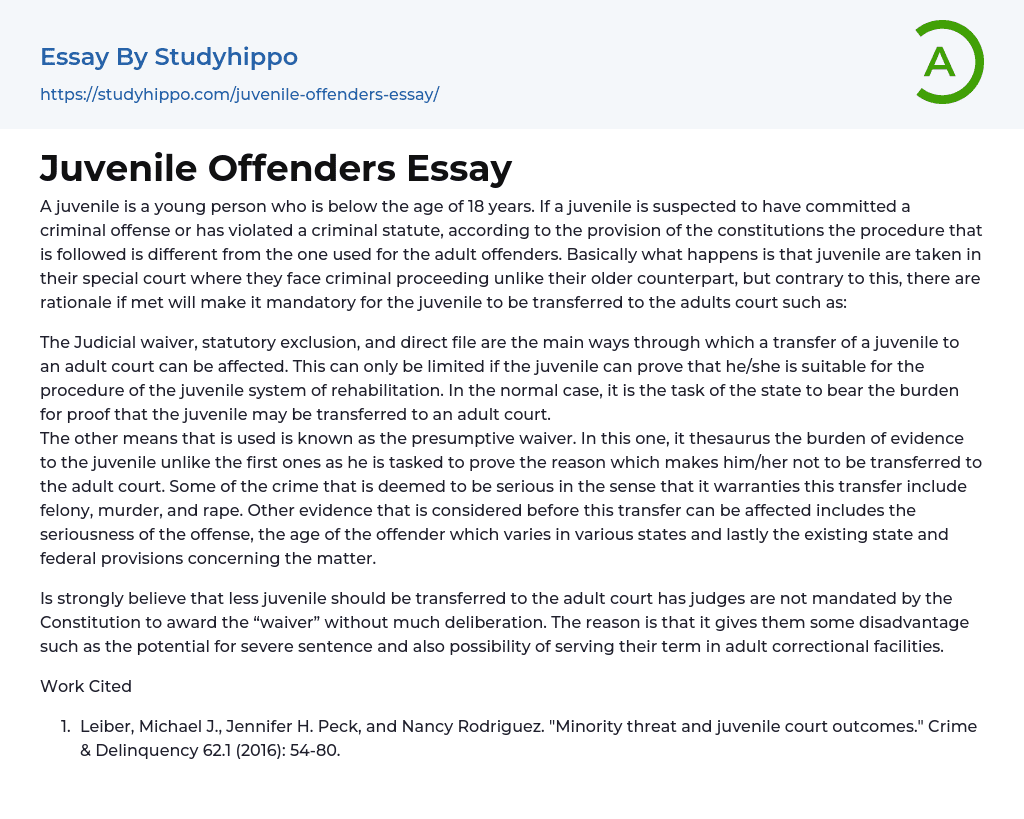A juvenile is defined as a person who is younger than 18 years old.
If a juvenile is suspected of committing a criminal offense or violating a criminal statute, their legal procedure is distinct from that of adult offenders. Juveniles are brought before a specialized court for criminal proceedings, unlike adults. Nevertheless, in some instances, juveniles may be moved to adult court given specific conditions are fulfilled. These conditions encompass the Judicial waiver, statutory exclusion, and direct file. The transfer can be avoided if the juvenile can prove that they are eligible for rehabilitation within the juvenile system. Normally, it is the state's responsibility to demonstrate that the juvenile should be transferred to adult court.
The other method employed is known as presumptive waiver. In contrast to the first methods, this approach places the responsibility of providing eviden
...ce on the juvenile rather than requiring them to demonstrate why they should not be transferred to adult court. Certain serious crimes, such as felony, murder, and rape, are deemed eligible for this transfer. Prior to the transfer occurring, additional factors including the seriousness of the offense, the age of the offender (which varies by state), and applicable state and federal laws are taken into consideration. There is a strong belief that fewer juveniles should be transferred to adult court due to judges not being constitutionally obligated to grant the "waiver" without careful deliberation.
The reason is that it gives them some disadvantage such as the potential for severe sentence and also possibility of serving their term in adult correctional facilities.
Work Cited
- Leiber, Michael J., Jennifer H. Peck, and Nancy Rodriguez. "Minority threat and juvenile cour
outcomes." Crime ; Delinquency 62.1 (2016): 54-80.
- Animal Cruelty essays
- Charles Manson essays
- Crime Prevention essays
- Crime scene essays
- Criminal Justice essays
- Criminology essays
- Cyber Crime essays
- Damages essays
- Detention essays
- Distracted Driving essays
- Drug Trafficking essays
- Drunk Driving essays
- Forensic Science essays
- Gang essays
- Hate Crime essays
- Homicide essays
- Identity Theft essays
- Juvenile Crime essays
- Juvenile Delinquency essays
- Juvenile Justice System essays
- Law Enforcement essays
- Murder essays
- Organized Crime essays
- Penology essays
- Piracy essays
- Prison essays
- Property Crime essays
- Prostitution essays
- Punishment essays
- Punishments essays
- Rape essays
- Robbery essays
- Serial Killer essays
- Sexual Assault essays
- Sexual Assault on College Campuses essays
- Sexual Harassment essays
- Sexual Offence essays
- Stealing essays
- Surveillance essays
- Ted Bundy essays
- Victim essays
- Violent crime essays
- White Collar Crime essays
- Domestic Violence essays
- Gun Violence essays
- Media Violence essays
- Video Game Violence essays
- Violence Against Women essays
- Violence in Video Games essays
- Youth Violence essays




